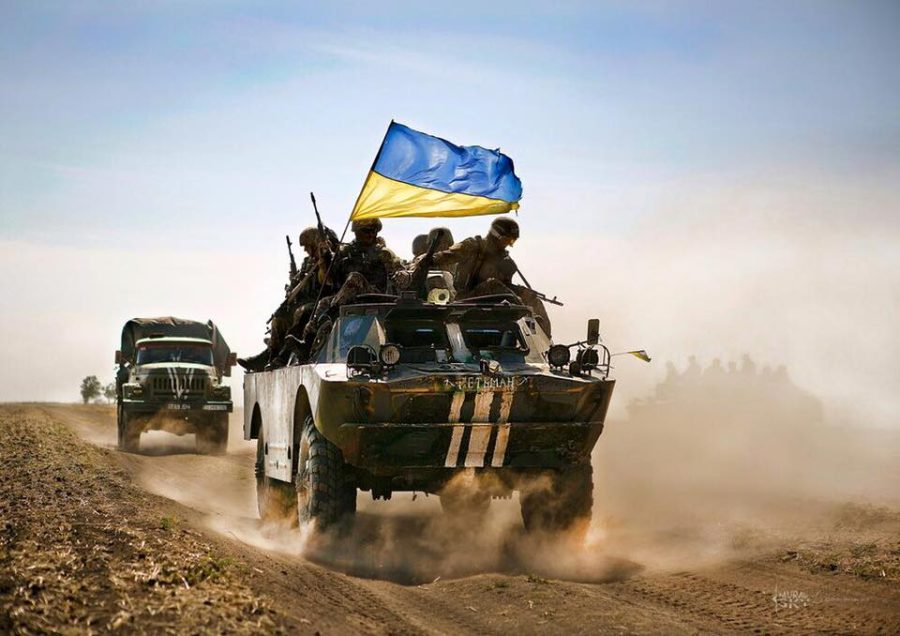A Modern Historical Failure
“Anti-terrorist operation in eastern Ukraine (War Ukraine)” by Ministry of Defense of Ukraine is licensed under CC BY-SA 2.0.
April 3, 2023
The ongoing conflict between Russia and Ukraine is now in its second year with no sign of ending. The discord has killed tens of thousands, displaced millions of people, and upended the region and the globe. It is a failure of modern politics to prevent and resolve such a crisis.
In case you live under a rock: the rise in hostility began late 2021 into early 2022 as Russia began building up forces on its border with Ukraine and in nearby ally Belarus. On Feb. 24, 2022, Russia finally invaded eastern and southern Ukraine, igniting years of enmity over Ukraine’s pro-Western alignment and Russia’s annexation of Crimea in 2014. Russia, otherwise known as Putin, claimed that it acted in defense of Russian-speaking minorities against Ukrainian aggression and fascism, but this was viewed by many as an attempt to undermine Ukraine’s sovereignty and territorial integrity.
The global community criticized Russia’s aggression, and the U.S. led world powers in levying sanctions on Moscow. Nevertheless, these actions proved futile in halting Russia’s advancement or in assisting in the defense of Ukraine. The U.S. and its NATO allies initially hesitated to provide lethal weapons or troops to Ukraine, concerned that it would escalate the issue and trigger retaliation from Russia. Meanwhile, Russia’s veto power paralyzed the UN Security Council, while the EU remained divided over its dependence on Russian energy and trade. Yet now – more than a year later – the U.S. and NATO allies have been sending billions in military and financial aid. The U.S. alone has sent over $50 billion in aid – enough to buy nearly 119 Boeing 747-8s at their current list price of around $418 million each. Yet, the war is still more or less at a standstill.
China, on the other hand, has attempted to mediate between Russia and Ukraine, but it also sought to take advantage of the war by expanding its influence and interests in both nations. China proposed a peace plan, calling for a ceasefire, dialogue, humanitarian aid, respect for sovereignty and territorial integrity, and cooperation on regional issues. However, many analysts doubted China’s impartiality and sincerity. Now, China has sought to strengthen Sino-Russian relations, which indicates that the war is becoming less about Ukraine and more about opposition to U.S. and Western-led global dominance.
All in all, Ukrainians seem to be in this for the long haul, but the failure of the post-Cold War global political framework propagated by the U.N. and major world powers to prevent this war is unmistakable. After the Soviet Union broke up in 1991, Ukraine was in a peculiar situation as it had much of the Soviet’s nuclear arsenal. As a part of a messy deal brokered mainly between the U.S. and Russia in 1994 known as the Budapest Memorandum, Ukraine gave up its nuclear arsenal in exchange for several security assurances. Yet, when Russia annexed Crimea in 2014, the U.S. only provided a warning that it didn’t back up. This lack of action in the past has opened the door to devastation in the present, and Ukrainians are paying the price.
The ongoing war highlights that current global politics are incapable of handling the challenges posed by an assertive Russia that seeks to restore its former glory and challenge the Western-led order. It further demonstrates that modern politics lack the vision and will to address the root causes of the conflict, which includes historical grievances, ethnic divisions, and economic disparities.
The war has resulted in a humanitarian disaster for both countries. The conflict has also become a security threat for the region and the world. It has escalated tensions between nuclear-armed nations, fueled extremism and terrorism, undermined trust and cooperation, and created new hotspots for conflict.
It is critical that the war ends soon before more damage and suffering is inflicted. However, ending the war necessitates more than just a ceasefire or a political settlement. It requires a fundamental change in modern politics and global relations, prioritizing dialogue over confrontation, cooperation over competition, justice over power, and peace over war. Is such a system even possible? Unfortunately, I think we’re a century too early, led by lackluster leaders from the last century. Politics needs change, Ukrainians need change, and we need change.
If you are interested, here is a video providing more information on the history and context behind this current conflict.



